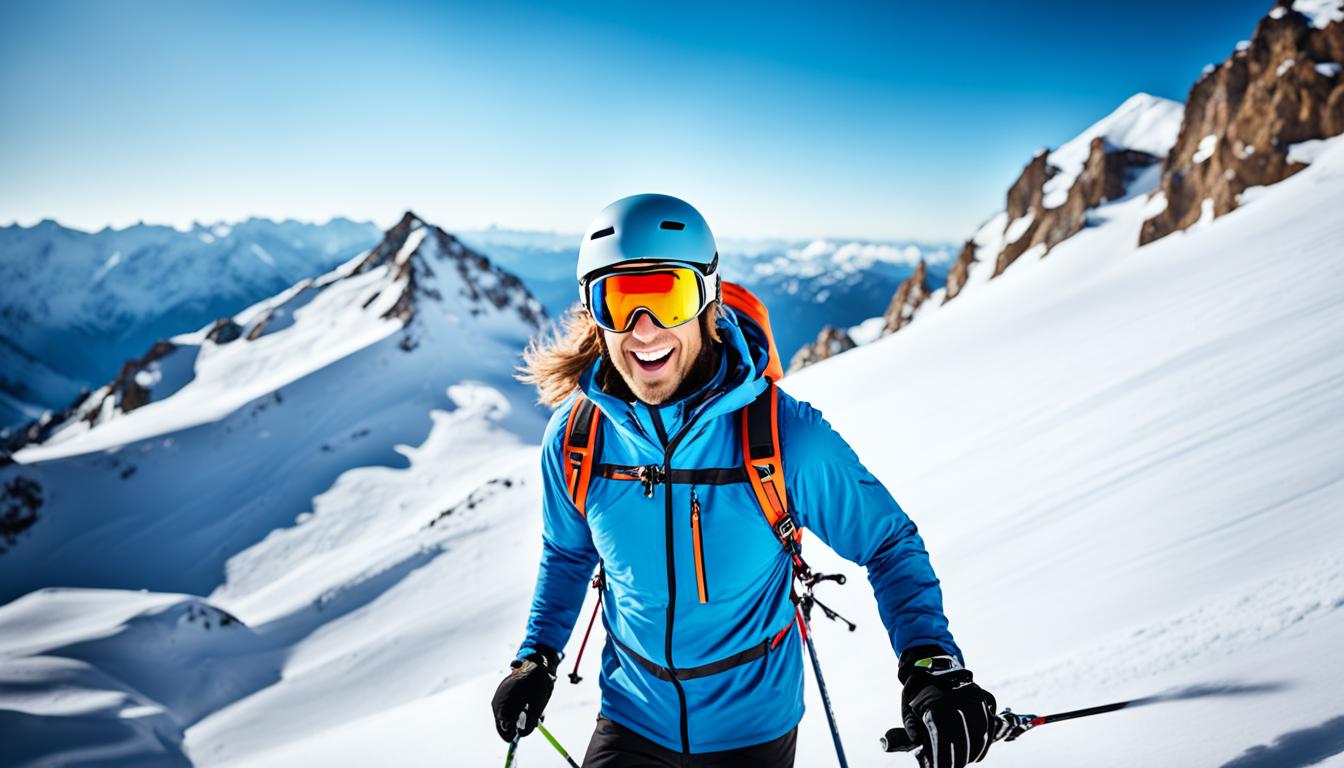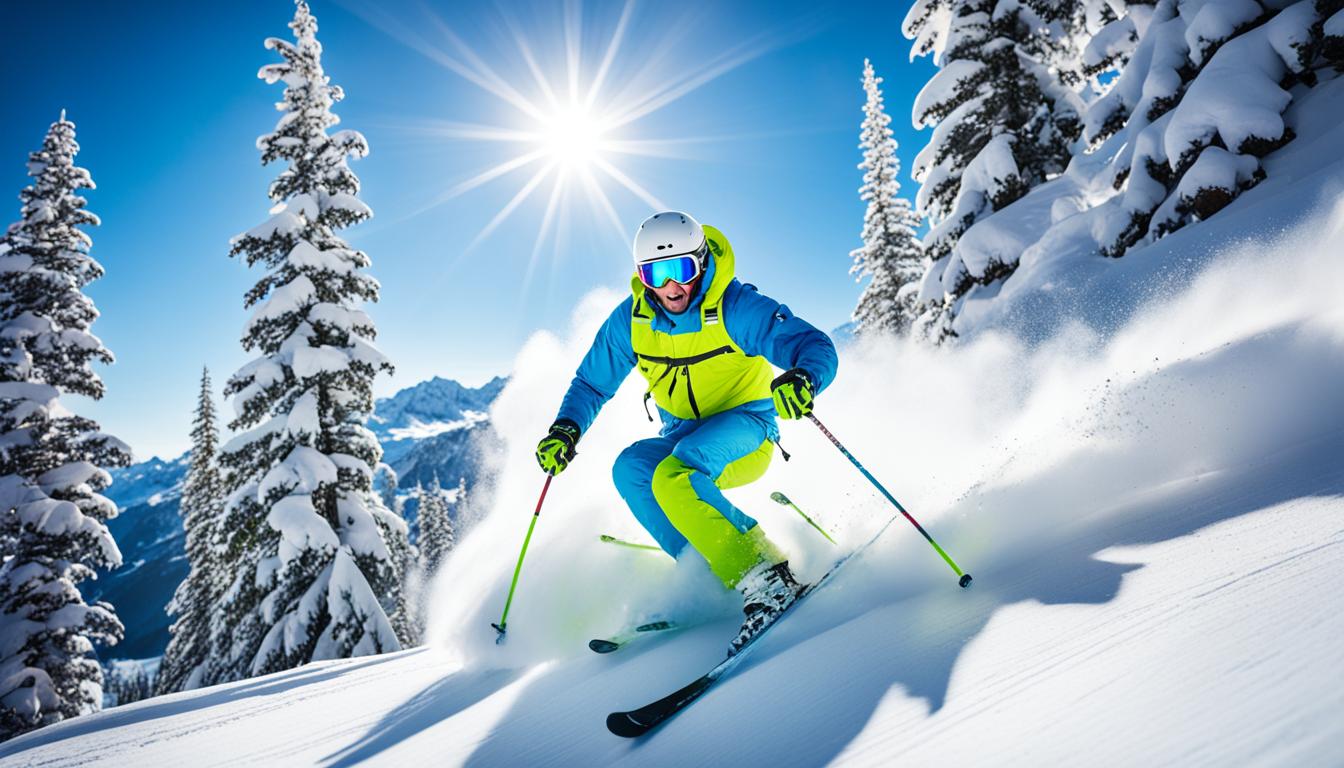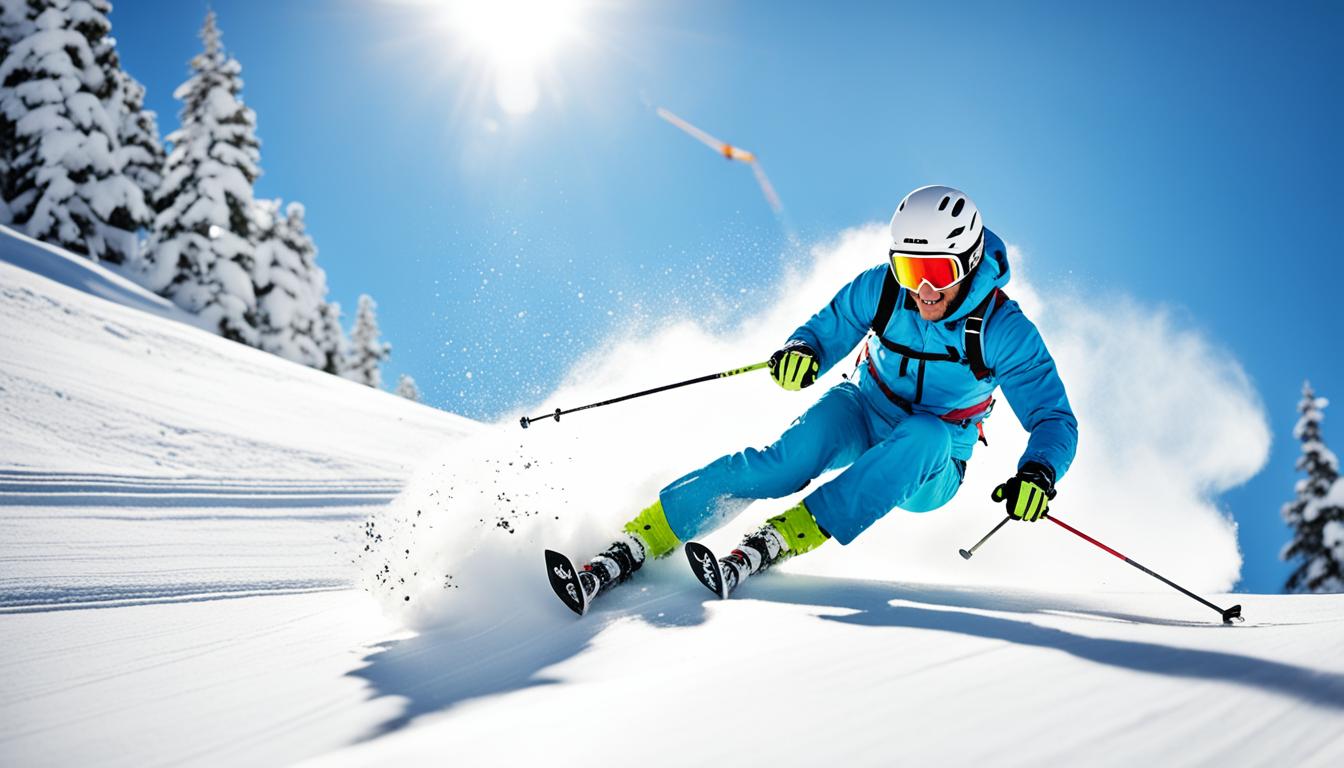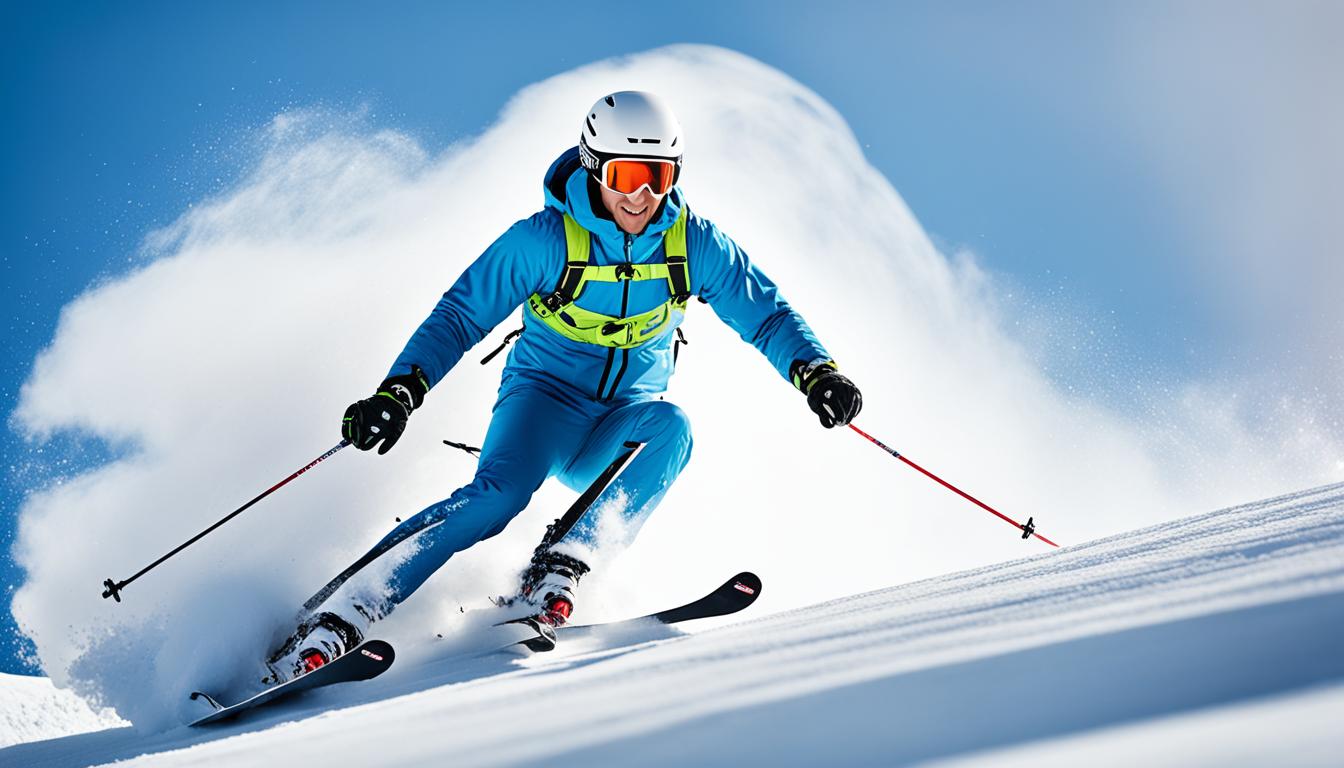Planning your first ski trip? Exciting! But before you hit the slopes, it’s important to make sure you have the right protection in place. Ski insurance for beginners is a must-have to safeguard against unexpected expenses and ensure a worry-free trip. In this guide, we’ll walk you through everything you need to know about ski insurance as a beginner, from coverage options to cost considerations. So, let’s dive in and get you ready for an amazing skiing adventure!
Key Takeaways:
- Beginner ski insurance coverage is essential to protect yourself from unexpected expenses during your ski trip.
- Understanding the different coverage options and costs will help you choose the right ski insurance plan for your needs.
- Trip cancellation coverage is important to reimburse prepaid expenses if you need to cancel your trip due to unforeseen circumstances.
- Make sure to check your policy for coverage against snow delays, so you’re protected against additional costs caused by flight delays or cancellations.
- Medical coverage is crucial, as skiing and snowboarding can carry the risk of injuries. Look for policies that include coverage for medical expenses and emergency medical evacuation.
The Importance of Trip Cancellation Coverage
Trip cancellation coverage plays a vital role in ski insurance for beginners. It provides reimbursement for prepaid and non-refundable expenses if you need to cancel your trip due to unforeseen circumstances. With this coverage, you can protect yourself from financial loss when faced with events such as illness, severe weather, or the unfortunate passing of a close family member.
When selecting your ski insurance policy, it’s essential to check the specific reasons covered by the cancellation coverage. This will help you understand the extent to which you can receive reimbursements for various situations. Additionally, consider adding “cancel for any reason” coverage to your policy for maximum flexibility. This optional coverage allows you to cancel your trip for any reason that may not be explicitly covered, providing you with additional peace of mind.
“Cancel for any reason” coverage can be beneficial in situations where you may have concerns that are not covered by standard trip cancellation reasons. It gives you the freedom to cancel your ski trip and receive reimbursement, regardless of the reason, as long as it falls within the policy terms and conditions.
The Benefits of Trip Cancellation Coverage:
- Reimbursement for prepaid and non-refundable expenses
- Protection against unforeseen circumstances
- Peace of mind knowing you won’t incur significant financial loss
- The option to add “cancel for any reason” coverage for flexibility
To better understand the importance of trip cancellation coverage, let’s take a look at a scenario:
| Scenario | Expenses | Reimbursement without cancellation coverage | Reimbursement with cancellation coverage |
|---|---|---|---|
| Trip canceled due to illness | $2,000 (prepaid hotel, flights, and rentals) | $0 | $2,000 |
| Trip canceled due to death in the family | $3,500 (prepaid hotel, flights, and rentals) | $0 | $3,500 |
| Unexpected severe weather disrupts the trip | $4,500 (prepaid hotel, flights, and rentals) | $0 | $4,500 |
As you can see from the table above, without trip cancellation coverage, you would incur significant financial loss if you cancel your ski trip. However, by having this crucial coverage in place, you can receive reimbursement for your prepaid and non-refundable expenses, providing you with the necessary financial protection.
Protecting Against Snow Delays
When planning a ski trip, it’s essential to be prepared for the unexpected, including the possibility of snow delays. Severe weather conditions can lead to flight cancellations or delays, causing additional expenses for accommodation and transportation. To safeguard yourself from these potential costs, it’s important to consider ski insurance with travel delay coverage. This coverage can provide reimbursement for expenses incurred due to trip delays caused by adverse weather conditions.
Travel delay coverage typically reimburses expenses such as hotel accommodations, meals, and transportation when your trip is delayed for a specific number of hours. However, it’s crucial to carefully review the terms and conditions of your policy. Be sure to check the maximum reimbursement limit per person and per day to ensure it aligns with your needs and expectations.
Having the right ski insurance with travel delay coverage can offer you peace of mind, knowing that you won’t be left to cover unexpected costs resulting from snow delays on your own. So, before embarking on your ski trip, make sure to include this coverage in your insurance plan.
Benefits of Travel Delay Coverage
By having travel delay coverage in your ski insurance plan, you can enjoy the following benefits:
- Financial protection against unexpected expenses caused by snow delays
- Reimbursement for hotel accommodations, meals, and transportation during the delay
- Peace of mind knowing that you won’t bear the full financial burden of unforeseen travel delays
How to Choose the Right Travel Delay Coverage
When selecting ski insurance with travel delay coverage, consider the following factors:
- Maximum reimbursement limit per person and per day
- Specific circumstances covered by the policy
- Waiting period before coverage becomes effective
- Exclusions and limitations
Being well-informed about the policy details will help you select the right coverage to protect yourself against snow delays during your ski trip.
A Real-Life Example
“Last winter, our flight was delayed for nearly 10 hours due to heavy snowfall. Thanks to our ski insurance with travel delay coverage, we were reimbursed for our hotel stay, meals, and transportation expenses. It was such a relief knowing that our unexpected costs were covered, allowing us to focus on enjoying our ski vacation.” – Sarah Williams, Ski Enthusiast
| Comparing Travel Delay Coverage | |
|---|---|
| Insurance Provider | Maximum Reimbursement Limit (Per Person, Per Day) |
| Insurance A | $200 |
| Insurance B | $300 |
| Insurance C | $400 |
Coverage for Snow-Related Injuries
Skiing and snowboarding are exhilarating winter activities, but they come with inherent risks. It’s crucial to have comprehensive medical coverage in your ski insurance to protect yourself from unexpected injuries. When choosing a policy, look for coverage that includes:
- Medical expenses: Ensure that your ski insurance plan covers medical expenses resulting from skiing or snowboarding accidents. This coverage should include doctor’s visits, hospital stays, surgeries, and medication. It’s recommended to have a minimum coverage of $50,000 for medical expenses to provide adequate protection.
- Emergency medical evacuation: In the unfortunate event of a severe injury, it may be necessary to transport you to the nearest medical facility or back home for proper medical care. Ski insurance with emergency medical evacuation coverage ensures that you won’t be burdened with exorbitant transportation costs. Consider a policy that provides at least $500,000 in coverage for medical evacuations.
- Hospital stays: Ski accidents can lead to extended hospital stays, especially if the injuries are serious. Ensure that your ski insurance plan covers hospitalization expenses, including room charges, surgeries, and other necessary medical treatments during your hospital stay.
Having adequate coverage for snow-related injuries gives you peace of mind on the slopes and protects you financially. It’s especially important if you’re planning to ski or snowboard outside the United States, as medical evacuations can be significantly more expensive in other countries.
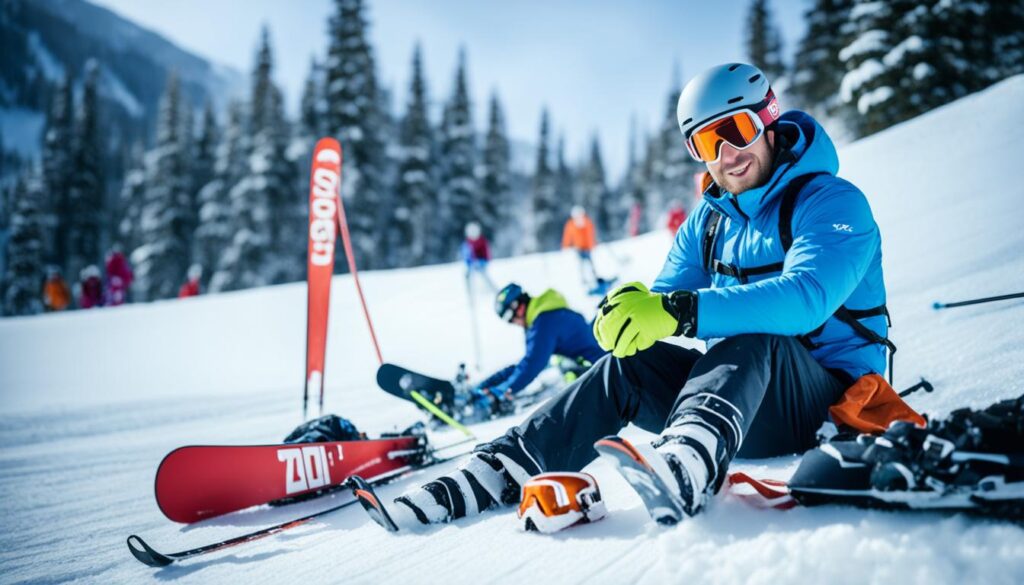
Equipment Coverage and Baggage Protection
When it comes to skiing and snowboarding, having the right insurance coverage is essential, especially for beginners. One key aspect that often goes overlooked is equipment coverage and baggage protection. We understand that your gear is not only valuable but also holds sentimental value. That’s why it’s important to ensure that you have the necessary coverage in case of any mishaps.
Check with your insurance policy provider to see if they offer equipment theft coverage, which will protect you in the unfortunate event that your equipment is stolen. Additionally, it’s crucial to have coverage for equipment damage, as accidents can happen on the slopes. This will give you peace of mind knowing that you are financially protected.
If you plan on renting equipment, it is advisable to check if your policy provides rental equipment coverage, which will cover any damage or loss to rented gear. This is particularly important for beginners who may not have their own equipment yet.
Besides equipment coverage, don’t forget about protecting your belongings, including your hand luggage. Baggage insurance is essential in case your bags are lost, stolen, or damaged during your trip. Having this coverage ensures that you won’t have to bear the financial burden of replacing your items.
“Having comprehensive coverage for your equipment and baggage is vital in ensuring a worry-free skiing or snowboarding experience.”
To give you a better idea of what to look for in terms of coverage, here’s a breakdown:
| Insurance Coverage | Benefits |
|---|---|
| Equipment Theft Coverage | Protection against stolen gear |
| Equipment Damage Coverage | Financial coverage for repairing or replacing damaged gear |
| Rental Equipment Coverage | Protection for rented equipment in case of loss or damage |
| Baggage Insurance | Reimbursement for lost, stolen, or damaged baggage |
Having the right coverage for your equipment and baggage is an essential part of your ski insurance policy. It ensures that you can fully enjoy your skiing or snowboarding adventure without worrying about the financial implications of any unfortunate incidents.
Tips for Safe Skiing and Snowboarding
While having ski insurance is crucial for beginners, it’s equally important to prioritize safety on the slopes. Here are some valuable ski insurance tips and best practices to ensure a safe and enjoyable skiing or snowboarding experience:
- Wear Appropriate Safety Gear: Protect yourself by wearing helmets and goggles. These essential pieces of equipment help prevent head injuries and ensure clear visibility on the slopes.
- Familiarize Yourself with the Mountain’s Rules and Regulations: Before hitting the slopes, take the time to review and understand the rules and regulations of the ski resort. This knowledge will help you ski responsibly and minimize accidents.
- Choose Slopes that Match Your Skill Level: Select slopes that align with your skiing or snowboarding abilities. Pushing yourself beyond your skill level can increase the risk of accidents and injuries.
- Practice Responsible Skiing: Show respect for others on the slopes by skiing or snowboarding at a reasonable speed, avoiding reckless behavior, and giving right of way to slower skiers or snowboarders.
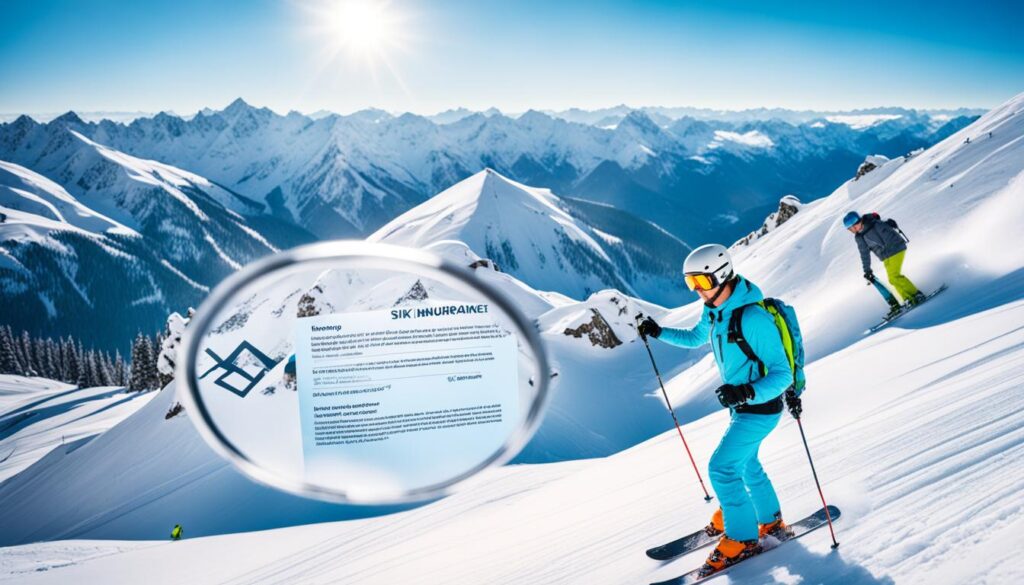
Safety should always be a top priority during your skiing or snowboarding adventure. By following these ski insurance tips and best practices, you can minimize risks and enjoy a memorable time on the slopes.
Conclusion
Ski insurance is a vital investment for beginners, offering financial protection and peace of mind on your ski trip. By selecting a comprehensive policy, you can ensure coverage for trip cancellations, snow-related injuries, equipment protection, and baggage. Don’t forget to explore additional coverage options that meet your specific needs, such as the flexibility of cancel-for-any-reason coverage or adventure sports coverage.
While ski insurance is essential, it is equally important to prioritize safety while enjoying your skiing or snowboarding adventure. Remember to wear appropriate safety gear like helmets and goggles, familiarize yourself with the mountain’s rules, choose slopes aligned with your skill level, and practice responsible skiing by respecting others on the slopes.
With the right ski insurance in place and a commitment to safety, you can embark on your ski trip with utmost confidence. So grab your skis or snowboard, explore the breathtaking slopes, and create unforgettable memories, knowing that you are protected by the best ski insurance practices for beginners.
FAQ
Why is ski insurance important for beginners?
Ski insurance is important for beginners because it protects against unexpected expenses and provides peace of mind during your ski trip. It covers trip cancellation, snow-related injuries, equipment protection, and baggage, ensuring that you’re financially protected in case of any mishaps.
What is trip cancellation coverage and why is it important?
Trip cancellation coverage provides reimbursement for prepaid and non-refundable expenses if you need to cancel your trip due to unforeseen circumstances. It’s important because it protects you from losing money on your trip if something unexpected happens, such as illness, severe weather, or the death of a close family member.
What is travel delay coverage and why do I need it?
Travel delay coverage reimburses you for additional expenses such as accommodation and transportation if your trip is delayed for a specific number of hours due to severe weather or other reasons. It’s essential because severe weather can cause flight delays or cancellations, and this coverage helps reduce the financial impact of these delays.
What medical coverage should I look for in ski insurance?
When choosing ski insurance, look for a policy that includes coverage for medical expenses, emergency medical evacuation, and hospital stays. The recommended minimum coverage is ,000 for medical expenses and 0,000 for medical evacuation. These coverages are important because skiing and snowboarding carry the risk of injuries and accidents.
Is equipment coverage included in ski insurance?
Some ski insurance policies include coverage for lost, stolen, or damaged equipment. It’s important to check if your insurance policy offers equipment theft coverage, equipment damage coverage, and rental equipment coverage. Additionally, make sure to have baggage insurance for all your belongings, including your hand luggage.
What are some safety tips for skiing and snowboarding?
To ensure a safe skiing or snowboarding experience, prioritize safety on the slopes. Wear appropriate safety gear such as helmets and goggles, familiarize yourself with the mountain’s rules and regulations, choose slopes that match your skill level, and practice responsible skiing by respecting others on the slopes. Following these tips will help prevent accidents and injuries.

